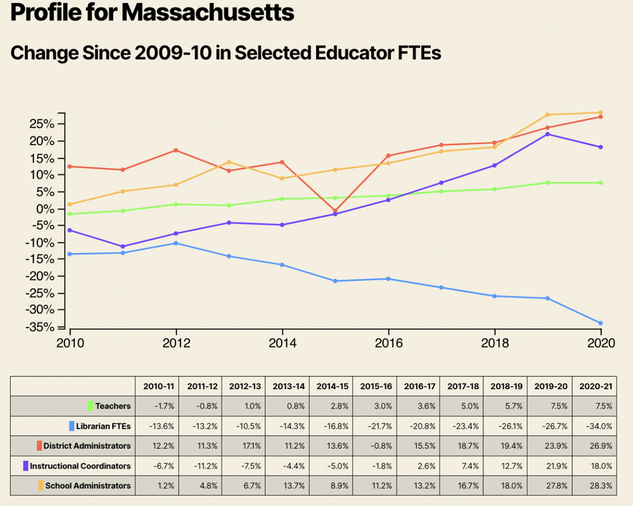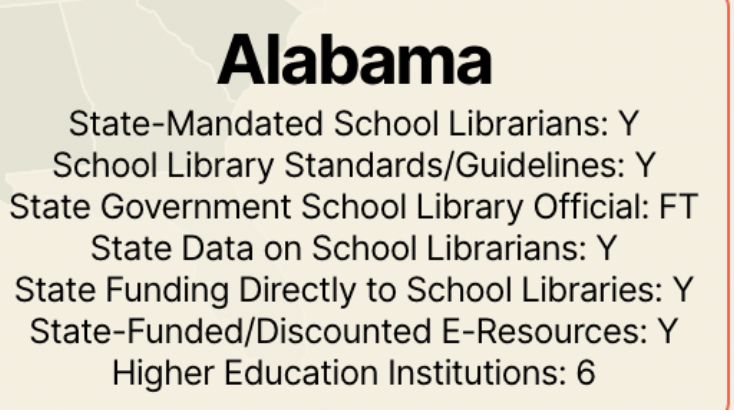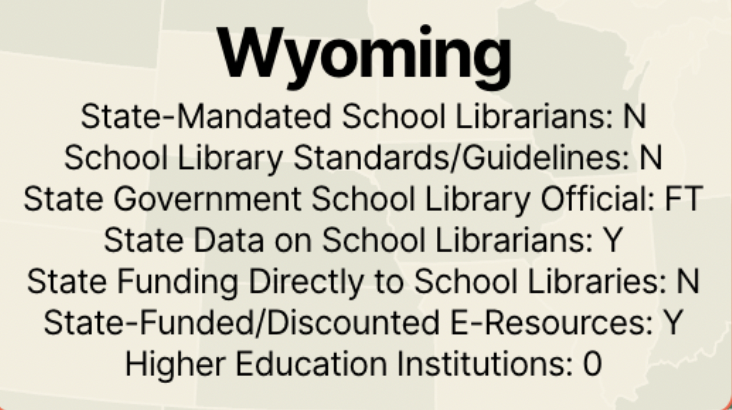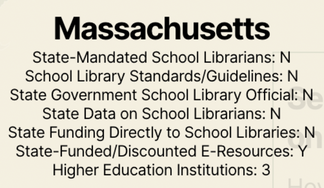- “How equitable is the distribution of school librarians by enrollment, district setting (urban, suburban, rural), race/ethnicity, poverty, and per pupil spending?
- What job titles, skills, and responsibilities are valued and sought by school leaders who decide staffing patterns that provide students and teachers with access to and instruction about learning resources, including library and educational technologies?
- What factors affect how school decision-makers choose to staff learning resources?
- What advantages do decision-makers perceive in their chosen models for achieving district goals compared to other alternatives they considered?” (About Slide)
One of the most valuable contributions of Project S.L.I.D.E. are the interactive data tools available on the project website. One tool compares staffing trends in districts and states. The profile for the Massachusetts chart compares the percent change in the number of librarian full-time equivalent (FTE) positions to other positions over a ten year period:
Education Laws and Institutions
Lance and Kachel provide additional information on key supports that states can provide such as state mandates for school librarians, state standards for school libraries, available state data on school libraries, higher education institutions for preparing librarians, and state departments of education which include a staff member responsible for school library programs. This combination of data provides a more holistic picture of the extent individual states support school libraries and identifies specific infrastructure, systems, and institutions that might impede or enhance school library growth. For example, between 2015 and 2018 Alabama initiatives enhanced school library growth the most nationwide, with the state “experiencing a 38.2% gain in librarian FTEs,” whereas “Nevada (-21.5%), and Wyoming (-28.6%) hold the bottom two spots losing the greatest number of positions” (State Perspective). Figure 3 shows Alabama’s profile and figure 4, Wyoming’s (State Survey).
In addition to the helpful data generators and state profiles, Lance and Kachel have published many articles on the Project S.L.I.D.E website during their research to explain their process, provide analysis of early findings, and identify trends. For example, a sobering statistic is the likelihood of school librarians being reinstated once eliminated. Lance & Kachel (2021) found that “nine out of 10 districts that had eliminated school librarians by 2015-16 had not reinstated them by 2018-19. This indicates that, once lost, a school librarian position was highly unlikely to be restored” (Probability). Other important articles analyze the trends of losing school librarians through a lens of equity and in schools post-Covid, from the International Association of School Librarianship newsletter; and a “library privilege” equity gap analysis, that explores the inequities associated with race and ethnicity compounded by poverty, locale, and enrollment in the Peabody Journal of Education.
Looking Ahead
Project S.L.I.D.E will wrap up in October 2023 and leave us with a final report and a wealth of information and data about the state of school librarians nationally, by state, and district. It is an opportunity to ask more questions, conduct more research, have conversations across states, and plan a course of action to sustain momentum to improve library services for K-12 students. Some questions to consider:
- How can school library professional organizations strengthen their role supporting school libraries and librarians?
- How can we build a culture of research in school librarianship?
- To what extent do factors such as state-adopted library standards, education laws, and higher education institutions shape the school librarian landscape?
- What impedes and enhances the reinstatement of school librarians?
- How is the school librarian’s impact on students’ learning, social-emotional health, and growth as citizens in a democracy being measured?
Institute of Museum & Library Services. (2023). Grants. U.S. Office of the Special Counsel. https://www.imls.gov/grants.
Kachel, D.E. & Lance, K.C. (2022, Oct.). COVID impact on access to school librarians in the United States. IASL Newsletter. (Reprinted with permission of the International Association of School Librarianship.)
Lance, K.C. & Kachel, D. (2020). About SLIDE. Project S.L.I.D.E.
Lance, K.C. & Kachel, D. (2020). Probability of reinstating school librarians once eliminated. Project S.L.I.D.E.
Lance, K.C. & Kachel, D. (2020). State perspectives. Project S.L.I.D.E.
Lance, K.C. & Kachel, D. (2020). State profile data tool. Project S.L.I.D.E.
Lance, K.C. & Kachel, D. (2020). State survey. Project S.L.I.D.E.
Lance, K.C. & Kachel, D.E. & Gerrity, C. (2023). The school librarian equity gap: Inequities associated with race and ethnicity compounded by poverty, locale, and enrollment, Peabody Journal of Education. 1–15. https://doi-org.antioch.idm.oclc.org/10.1080/0161956x.2023.2160112






